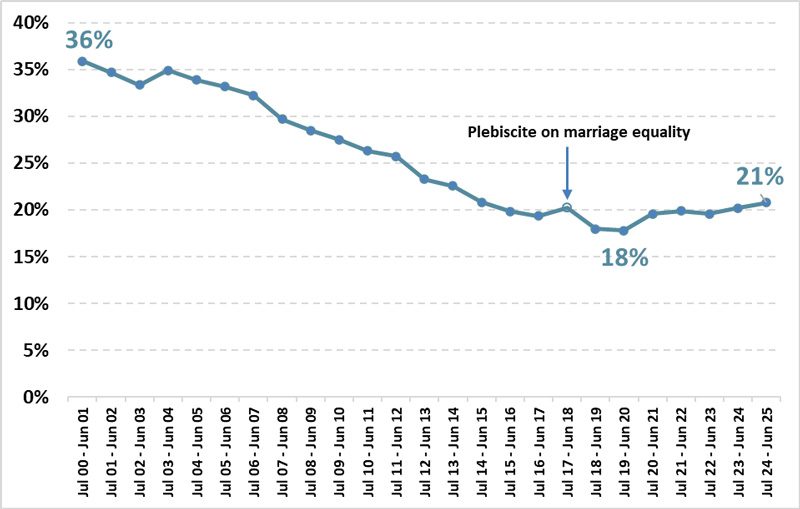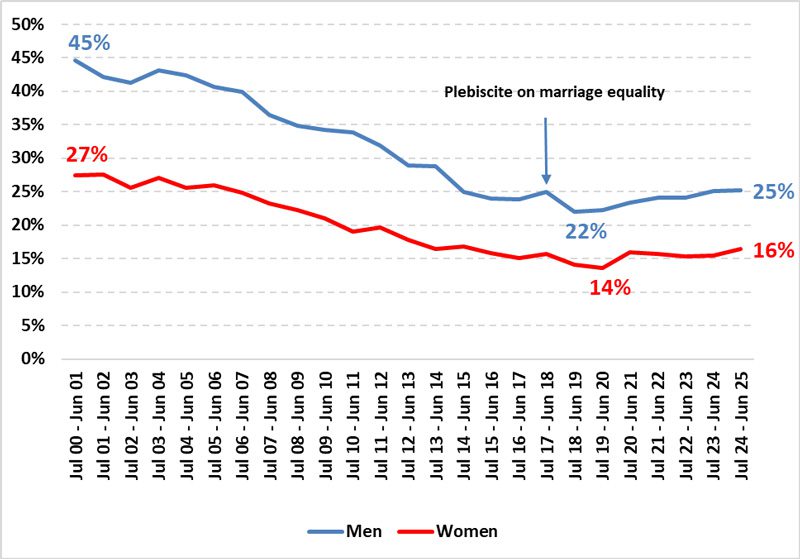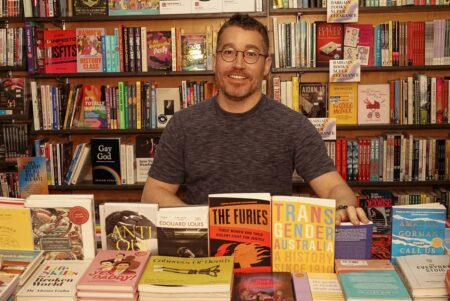Australians’ views on homosexuality have steadily improved for more than two decades, but new research shows that trend has started to reverse.
Market research firm Roy Morgan has tracked attitudes since 2000, asking about 1000 Australians each week whether they agree or disagree with the statement: “I believe homosexuality is immoral.”

In 2000–01, 36 per cent of Australians agreed. That number fell below 30 per cent by 2008–09, then dipped under 20 per cent in 2016–17 ahead of the marriage equality debate and legislation. The lowest level recorded was 18 per cent between 2018 and 2020.
The latest figures, covering 2024–25, show 21 per cent of Australians still believe homosexuality is immoral – up from that record low, and marking the first sustained increase in more than 20 years.
Persistent gender divide
Roy Morgan’s analysis shows men remain more likely than women to hold negative views. A quarter of men (25 per cent) now believe homosexuality is immoral, compared with 16 per cent of women.
Back in 2001, almost half of men (45 per cent) agreed with the statement, compared with just over a quarter of women (27 per cent).

Roy Morgan chief executive Michele Levine said that despite long-term progress, recent shifts were concerning.
“Homophobic attitudes in Australia have fallen steadily over the past 25 years, down 15 percentage points,” she said.
“However, over the past five years the downward trend has stalled, edging back up to 21 per cent by 2024–25, marking the first sustained increase in over two decades.
“Women show greatest acceptance, with only 16 per cent now viewing homosexuality as immoral, while one in four men (25 per cent) still hold anti-gay views, showing progress but also a persistent gender gap.”
Levine pointed to the media attention surrounding former West Coast Eagles player Mitch Brown, who came out in August and became the first openly bisexual male player in VFL/AFL history. She said the coverage highlighted both advances in acceptance and the need to challenge lingering prejudice in sport and society.
Community response
Equality Australia chief executive Anna Brown said the numbers reflected what communities were already experiencing.
“Rising homophobia is not happening in a vacuum – we’ve witnessed a rise in anti-LGBTIQ+ hate across Australia driven by increasingly organised extremists seeking to undo decades of hard-won progress,” she told Gay Sydney News.
“Sadly, this hate can translate into real world violence, including the spate of ‘gay bashings’ connected to online dating apps like Grindr.”
Quantifying that violence remains difficult. NSW Police do not record hate crime as an associated factor in offending, and Bureau of Crime Statistics & Research figures show no court finalisations under the Crimes Act 1900’s hate crime provisions in the past 12 months.
Brown said the statistics should not obscure the overwhelming support for equality.
“Let’s not lose sight of the fact that the vast majority of Australians support LGBTIQ+ people,” she said.
“Our polling during the federal election found that nearly 90 per cent of people believe our communities deserve to live with dignity and respect – we have millions of allies who want a society built on solidarity and not hate.”
Eliot Hastie is a senior news producer at Channel Ten, reporting on a range of general stories, specialising in foreign affairs and LGBTQ+ stories. He’s also a reporter for Gay Sydney News, where he covers LGBTQIA+ culture, politics and nightlife. He previously helped to build and launch ausbiz, Australia's only live streaming finance news channel, where he was also an executive producer and host. He has previously worked as a finance and business journalist for publications including Fintech Business, Real Estate Business and other Momentum Media titles. Eliot holds a journalism degree from the University of Westminster and brings experience in both broadcast and digital reporting. Contact Eliot: eliot.hastie@gaysydneynews.com.au



